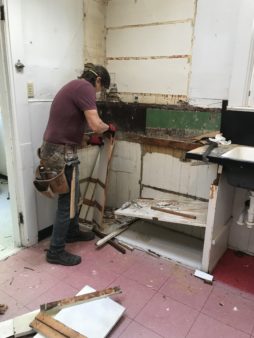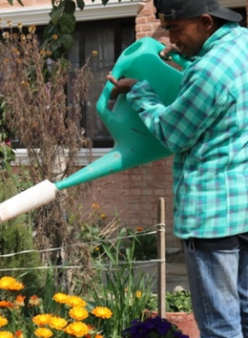Author: crystalnyf
Donor Spotlight: Eric Welty

How Eric, a retired carpenter, continues to generously support NYF
Eric Welty and his wife, Shelley, are long-time NYF supporters. They’ve been giving to NYF annually since 2009.
A couple years ago, we noticed the frequency of his gifts increasing throughout the year. His gifts also started to include notes at the bottom that perplexed us: “built-in desk”, “shelves,” or simply, “work.”
That’s when we learned that Eric, who had recently retired as a carpenter, had started donating his time and payment for labor to support NYF.
We were so touched to hear this, and reached out to Eric to see if we could learn more.
Eric was kind enough to chat with us for a quick interview in February 2021 to talk about how and why he supports NYF in this creative and generous way. Now, in honor of #NationalVolunteerWeek, we’re excited to share this with all of you a part of our wonderful conversation with Eric Welty.
Thank you again for agreeing to chat with us! Let’s start with your NYF story. How long have you known and/or supported NYF, and how did you come to know of us?
I allowed my higher self to guide me to Nepal, first. Nepal had a calling to me – and after reading about Nepal and learning more about Nepal’s needs, I was then led to NYF.
It was quite a few years ago, actually, back when NYF went by a different name.
Oh! That was back when we were named Nepalese Youth Opportunity Fund. Wow, you’ve been with us since the old days.
Right! And I feel so very fortunate to have found NYF.
Could you please elaborate on how you are currently supporting NYF?
My wife and I are both retired. We’re not wealthy, but we have enough. And as a retired carpenter, I’m still very healthy, and I actually still like working. But I wanted to volunteer now. And so I get projects from friends and friends of acquaintances, and then donate all the money that I make.
That’s wonderful. Thank you so much. What’s motivates you to continue these projects?
I’ve learned over the years that to be self-serving and feeding my desires to accumulate more stuff in my life is not very satisfying. I find that it’s far more satisfying to feed my inner peace by giving service to those who need it.
I can also make a fair amount of money here, but that money goes so much further in Nepal.
You’re absolutely right. What has been some of your favorite moments while doing this work?
I don’t know if I have a specific moment – but just knowing that the financial support is going to people who are most vulnerable.
Also, by donating, I know that the love and care that is extended by the staff in Nepal towards the children should help to promote a healthy and more adjusted adult. And in turn, that’ll perpetuate a better cycle going forward.
On a side note, another thing that’s interesting is that when I made a decision to begin this project, it seemed like the universe was helping in a way. The work comes in a timely manner; not all at once [laughter]. That also reassures me that I’m doing something worthwhile.
[Laughter]. Definitely! What a lovely thing to say though, about helping to perpetuate better cycles. That brings us to our next question: Do you have a favorite NYF program?
What struck me originally was the work you were doing to rescue and free girls sold into Kamlari indentured servitude. I found that inspiring. I realized what little money was needed save these girls. How could I not?
And when I would write a check at the end of the year, I would really feel like something was being done.
Our Empowering Freed Kamlari program is a really great one. I’m not sure if you’ve heard, but it’s actually coming to an end on our side. The freed girls have started their own nonprofit!
I heard! That’s great.
It really is.
You know, I’ve been watching NYF evolve as time has gone by, and I’m even more encouraged now than I was years ago.
That means a lot, Eric, thank you. Our last question is if you had any advice for other kindhearted folks who want to help out like you.
Run with whatever you find that resonates with you, like it did for me. Trust your inner guide!
Love it! Thank you so much!
We’re so grateful to Eric Welty for this special chat, and of course, for all that he’s doing to support our work. If you are fundraising for NYF or supporting our work in a creative way, and would like to be interviewed for a donor spotlight, let us know! E-mail us at: info@nepalyouthfoundation.org.
The Olgapuri Farm
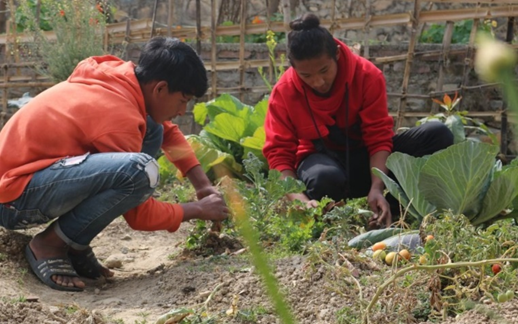
NYF President Som Paneru grew up on a family farm in Nepal’s Gorkha District. Every member of the family had to work very hard ensuring the crops grew well and the livestock were cared for. Hard work was a matter of survival. When his schooling began at age seven, Som would wake early enough to do farm chores, then hurry for an hour on foot to attend classes. At the end of the school day, he would hurry home, eat a quick snack, and return to the fields until dusk.
When he talks about his upbringing, Som does not shy away from discussing the hardships. But farm life taught him valuable life lessons, too. Lessons about personal responsibility, teamwork, motor skills, decision-making, risk-taking, and resourcefulness.
Olgapuri Children’s Village was designed with these lessons in mind. After all, for most of Nepal’s population, agriculture is still an integral part of family life. Som wanted our family-style oasis to share these opportunities with the children in our care.
The Olgapuri farm is home to 19 cows, 129 chickens, and ten dogs, so the milk and eggs consumed on the enclosed campus are all produced on-site. Nutritious vegetables are grown here, too, using organic farming methods, and a brand-new row of greenhouses are helping to significantly expand growing options. Food not used by the children and staff can be sold at local markets.
Olgapuri children are not required to work on the farm, but they are certainly encouraged to connect with nature by doing so. Some children prefer not to participate, but others really enjoy working with growing things! A small group of them have even created a child-led gardening club. The remaining work is done by staff members.
Som hopes that one day Olgapuri Children’s Village will be entirely self-sufficient, and the farm is part of that dream.
SAAET Project: Lockdown inspires new growth for young women in Nepal
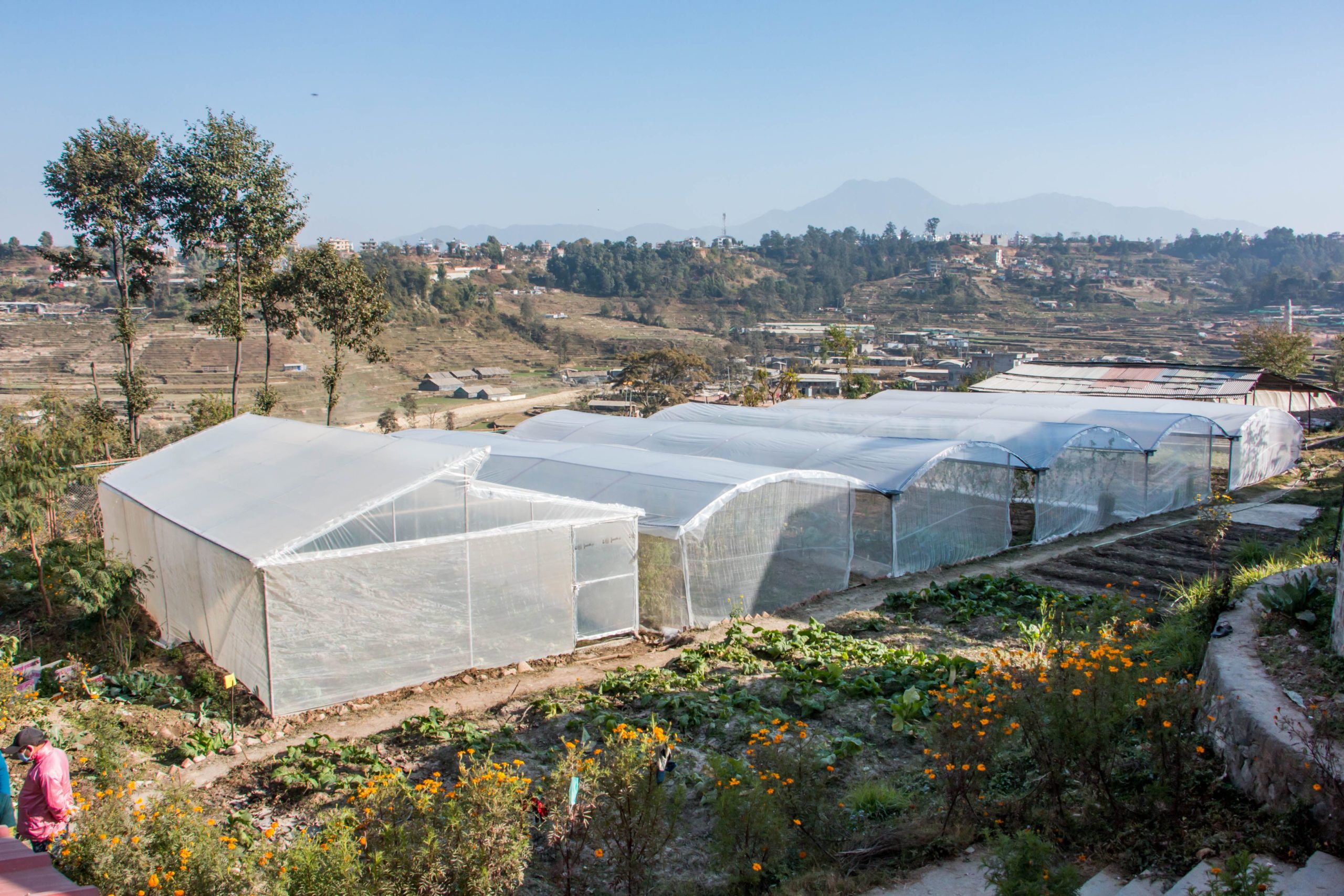
A letter from President Som Paneru
Dear NYF friends and family,
One year ago, just before the pandemic began, NYF was working to engage more women in our vocational education programs. We had seen that most of the young people interested in coming to Olgapuri Vocational School were young men—no matter how hard we tried to encourage young women to apply.
We reached out to families and learned that many young women were anxious about living near a big city like Kathmandu. Others insisted that even if they learned the skills offered—carpentry, plumbing, welding, and electrical—the pervasive culture of workplace sexism in Nepal would ensure they never truly advanced in a career. To these young women, the risks associated with these career goals were simply too great. As we worked to design an enriched program especially for them, the pandemic arrived. Olgapuri Vocational School was forced to shut its doors until further notice.
That is when the pandemic forced us to look at the problem differently.
During the lockdown, a generous donor helped us begin building a beautiful group of greenhouses on the Olgapuri grounds. As I oversaw the progress, I wondered—could we design a pandemic-safe vocational education program for young women that could bring greenhouse technology and training to their villages?
Greenhouses are relatively inexpensive to build and maintain, and can provide an enormous economic benefit to women in rural communities.
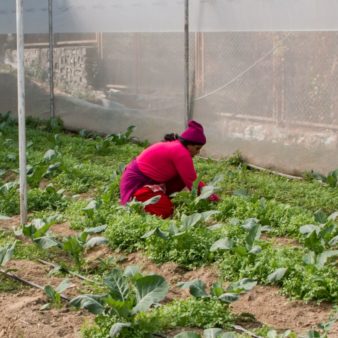
This is how the new SAAET Project was born. Saaet means “an auspicious moment of starting a new journey” – and it stands for Sustainable Agricultural and Entrepreneur Training.
Starting this spring, our greenhouse trainer will travel to rural villages to quarantine and then provide hands-on training to classes of 20 young women each. Students will learn the basics of organic farming, nursery techniques, construction and use of plastic greenhouse and drip irrigation, budgeting, bookkeeping, and more. By the end of the training, each woman will be prepared to manage her own greenhouse—feeding herself and her family with nutrient-rich vegetables, and often making extra income, even during a crisis.
Including the start-up materials for each girl’s fully-functional greenhouse, the project’s cost per village is $7,500. In our first year, we hope to bring the SAAET Project to five villages—or 100 young female entrepreneurs.
I am so grateful for the loving support that has made this project possible during an unprecedented crisis. Your gifts are helping Nepalese young people build towards better health and brighter futures.
Dhanyabad,

Som Paneru
President
Our U.S. Office is Moving!

Our U.S. team is excited to announce that we’re moving from our Sausalito office to a beautiful space in San Francisco! Here’s our new address, effective immediately:
Nepal Youth Foundation
1016 Lincoln Blvd, Suite 222
San Francisco, CA 94129
Please update your records and discard any old donation envelopes with our old address attached to ensure any mail reaches us successfully! Our phone number will remain the same at 415-331-8585.
The new office, at the Tides Converge, is part of a collaborative workspace owned by a nonprofit and reserved especially for nonprofits. A major perk is lower rent, which will allow us to stretch each thoughtful gift further than ever to support Health, Shelter, Freedom, and Education for the children we serve!
NYF’s U.S. team is looking forward to the day when we leave COVID behind. We’re so excited to welcome partners, donors, friends, and other members of the NYF Family to our new home!
Please email us at info@nepalyouthfoundation.org if you have any questions about our new space.

The Tides Converge is in The Presidio of San Francisco. Click here to see it on Google Maps!
CASHE Presents “Women of Nepal”
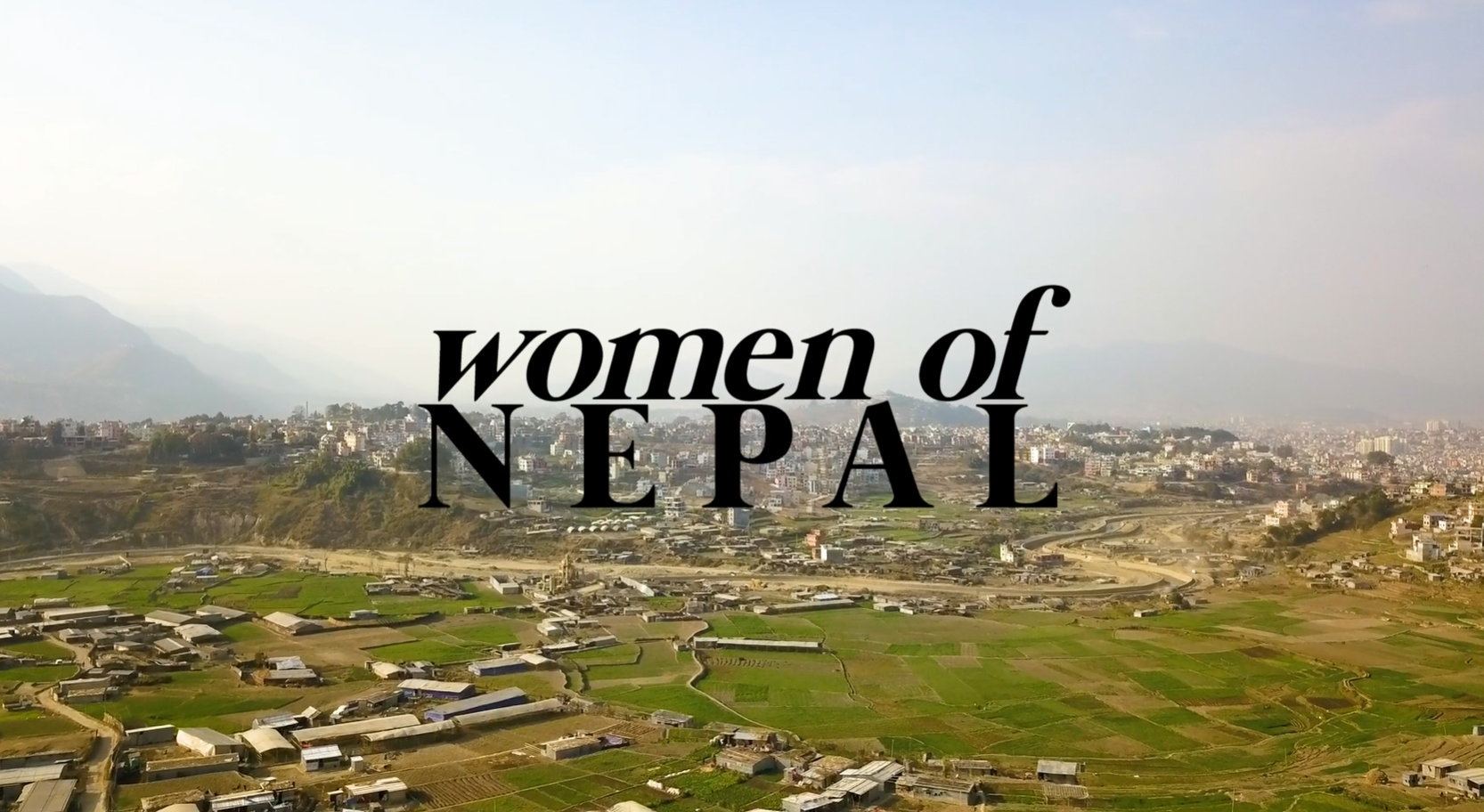
“Women of Nepal,” a short film produced through a partnership between multimedia journalist Rajneesh Bhandari, CASHE, and NYF, was released on International Women’s Day—March 8th, 2021. The film showcases the intersection of livelihood and motherhood for two profound women: one woman proudly supported by NYF’s foundational efforts and another working in manufacturing to produce CASHE cashmere.
We are so proud to share “Women of Nepal” with you now!
Cashmere Crafting
Sunita Maharjan, a craftswoman and mother of twins, has an undying passion for textiles and the cultural value Nepali garments carry across borders. This love for her trade is driven by more than skill; her children’s pride in her craft make it something to be done with dignity.
“Many people have the concept that women should do only household chores, but I don’t feel that way,” Sunita noted. “I feel very happy to know that the products we make are exported. Sometimes when I watch fashion shows on television I see people wearing dresses similar to what we make. It makes me very happy as I also make similar dresses.”
We at NYF are so grateful for partners like CASHE, who are truly devoted to elevating the remarkable craftspeople behind the luxury cashmere they bring to the international market. CASHE donates 10% of every purchase to NYF, and wherever possible, they use their press coverage to highlight the valuable work NYF does for Nepalese children.
CASHE was briefly featured in Sage & Sound recently, as well as on the Bri Books Podcast (CASHE/NYF are talked about at the 3:25 minute mark). CASHE is even featured in the April 2021 Issue of British Vogue!
Nutritional Rehabilitation Homes
Sangita Bhusa, a mother of two who has overcome tuberculosis, is forever grateful for the care she received from the Nepal Youth Foundation’s Nutritional Rehabilitation Home. Working since the age of seven, Sangita has overcome many difficulties supporting herself and her children. She returned to work a mere fifteen days after the birth of her first child.
“My mother suggested that it is better to work than to die of hunger. That is how I started working from an early age,” Sangita shared.
Sangita is just one of hundreds who benefit every year from the intensive nutritional care offered at NYF’s Nutritional Rehabilitation Homes (NRHs).
According to UNICEF, malnutrition contributes to over half of all child deaths in Nepal. NYF is working to combat that grim statistic with Nutritional Rehabilitation Homes built to accommodate malnourished patients discharged from nearby hospitals.
Before the development of NRHs, the Nepalese hospital system was not equipped to provide the long-term, holistic care needed to address chronic malnutrition in patients. Malnourished children were treated for acute illness and then discharged—often to continue suffering the long-term complications of malnutrition.
At NRHs, children are provided with holistic medical and nutritional care until they have reached a healthy weight. Meanwhile, their caregivers are trained in preparing delicious, nutrient-rich meals using locally-available, affordable ingredients tailored to their own home regions.
NYF has built a total of 17 Nutritional Rehabilitation Homes, including our flagship in Kathmandu Valley, which will remain under NYF control. The remaining 16 were designed to gradually transition into the government-run health system itself. So far, 15 have successfully made this transition, with the last, on track to transition in 2022. Training for NRH staff members takes place at the Kathmandu Valley flagship, which is well-known in the region as a valuable educational asset for anyone specializing in childhood nutrition.
Dhanyabad, CASHE!
We are so grateful to CASHE for highlighting our valuable nutrition programming in “Women of Nepal”! To learn more about our partnership with CASHE, please read our partnership announcement here and our spotlight on Nepalese cashmere here.
You may also visit CASHE’s online shop here.
To support the cautious reopening of NYF’s important nutritional programming, including our Nutritional Rehabilitation Home in Kathmandu Valley, please consider making a thoughtful gift today! Make sure your #LoveWorks for the women of Nepal… and their children, too!
Female Lawyers – A New Milestone for the Freed Kamlari Community
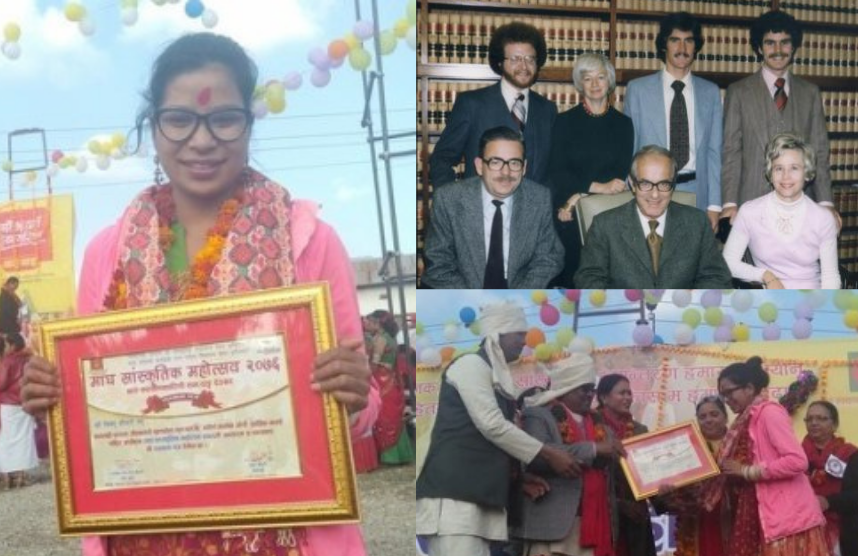
Female lawyers hold a special place in my heart—especially those embarking on this challenging career in a time and place in which women are not always welcome.
For those who do not know me, welcome! I am Olga Murray, the founder of Nepal Youth Foundation. Since the mid-1980s, I have dedicated my life to helping the children of Nepal to achieve their dreams. The work is an incomparable joy! Many of these kids’ successes have absolutely astonished me.
I have recently learned from Som that Bishnu Chaudhary has passed the bar exam in Nepal. This makes her the first Freed Kamlari to become a lawyer.
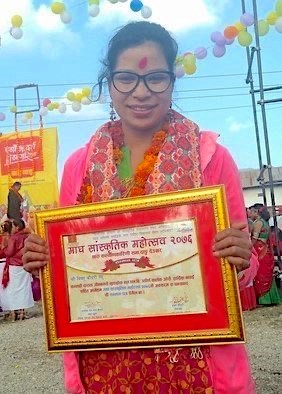
Kitchen Slavery
Bishnu’s father sold her into kamlari bondage when she was ten years old. Initially, he needed her wages to pay off a debt of under $40 (at the current rate of exchange), and later to assure that he could continue to work as a farmer for her employer. If she had stopped working, her family would have been left with no land to farm—and no way to feed themselves.
As a kamlari servant, Bishnu was denied an education and was instead forced to spend her childhood working long hours doing laundry, dishes, housework, and other tasks assigned by her family’s landlord. It was hard, demeaning work in an unforgiving environment. This was no place for a child.
(You can learn more about the kamlari practice, and NYF’s response, here.)
Rescue & Education

NYF rescued Bishnu from kamlari bondage in 2004, as our Indentured Daughters program (later the Empowering Freed Kamlari program) began to take root in the impacted Tharu communities.
She wanted desperately to go to school, and though her father at first refused, the teachers at the local school convinced him to allow her to enroll. Bishnu proved to be an outstanding student throughout her school years, taking as many opportunities for growth and development as she could. NYF has proudly supported her education from the beginning. Bishnu was admitted to law school in Kathmandu and graduated last year (pictured above).
Social Activism
During her student years, Bishnu was an outspoken and passionate leader in opposing the practice of kamlari, leading rescue operations of indentured children and convincing parents not to send their daughters away. She even risked being expelled from school because she insisted on liberating kamlari who were working for her own headmaster and teachers. Now that’s courage!
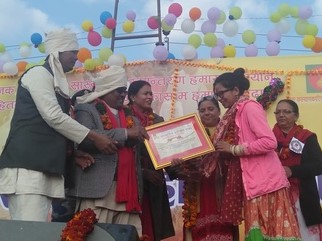
At Maghe Sankranti 2020, before the pandemic, Bishnu’s local government presented her with an award for the work she has done for her community (pictured left). I am gratified to see the ways these women, once mistreated and made to feel worthless, are being recognized and honored for their remarkable achievements.
Bishnu has continued in her activism, providing counseling and advice for former kamlari. Her aim is to advocate for girls and women in all aspects of the law – a tall order in Nepal, where paternalism reigns supreme.
A New Milestone

Female lawyers are a new phenomenon for Bishnu’s ethnic minority community, the Tharu. But Bishnu is just the first in the pipeline.
Up next is Urmila (left), the leader and heroine of the anti-kamlari movement, who was indentured at the age of six and did not begin school until she was 18, against the advice of almost everybody. Urmila is in her second year of law school and intends to work in the area of human rights, particularly women’s rights, after graduation.
How exciting to know Tharu women will have powerful female lawyers representing them in Nepal, and showing young girls what women can accomplish!
International Women’s Day 2021
I identify with these young women because, although I have never been sold into indentured servitude, I know the difficulty of embarking on a career in which women were not always welcome. I graduated from law school 66 years ago (gulp!), becoming a female lawyer at a time when there were few women in the profession, and the prospect of looking for a job was terrifying.
I was honored to spend my career in the company of those working to advance the rights of minorities in the United States. Below, I stand with my colleagues as a research attorney for California Supreme Court Justice Stanley Mosk.
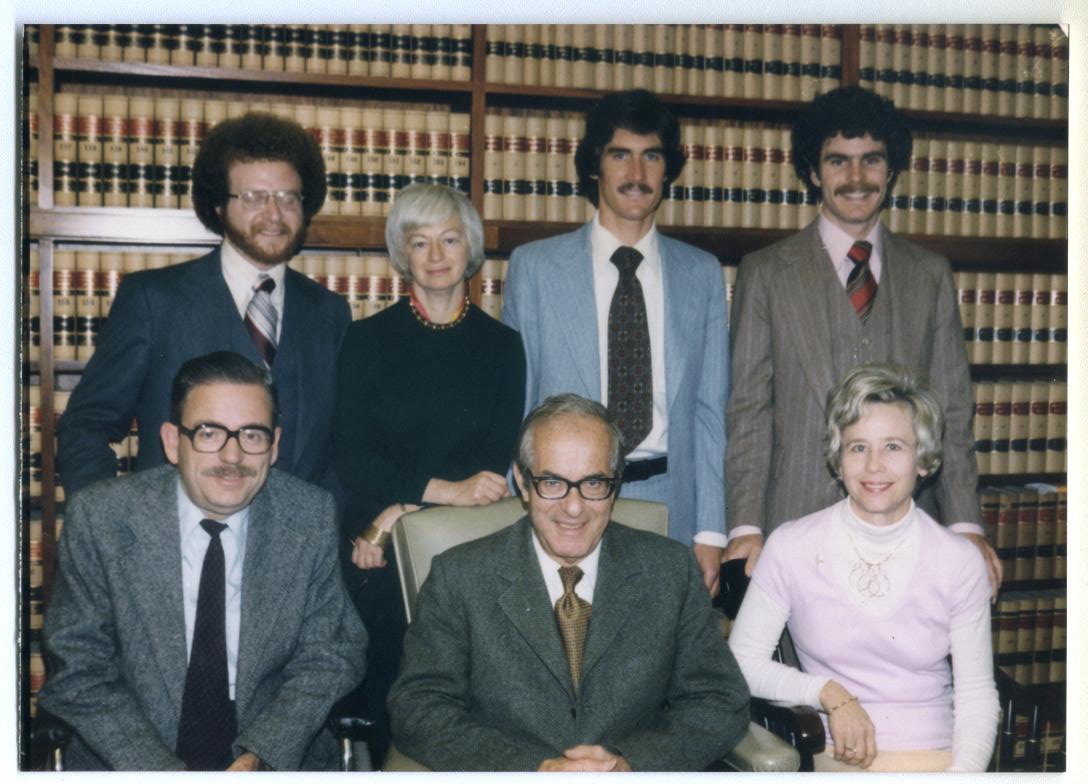
International Women’s Day, now held on March 8th, has been celebrated since 1911, when it was organized in Europe. Women then were campaigning for women’s rights to work, vote, be trained, hold public office, and end discrimination. Other early causes involved labor legislation about safety standards and child labor, combatting violence against women, and agitation for peace.
Now, this day is an opportunity to celebrate women’s achievements, raise awareness about women’s equality, and lobby for change.
The International Women’s Day theme in 2021 is “Choose to Challenge”—something the NYF Family has been doing for over 30 years, and something the Freed Kamlaris have done with gusto.
The work isn’t finished—but change is coming, one milestone at a time.
Today, for the Freed Kamlari communities, Bishnu, Urmila, and other daring women are choosing to challenge the status quo in their countries. I have full confidence that both Bishnu and Urmila will succeed in their goal to improve the status of women in Nepal because of their determination, their smarts, and the lessons they learned in their struggles to overcome injustice.
Mayama: CASHE’s Valentine’s Day Collection Shows #LoveWorks
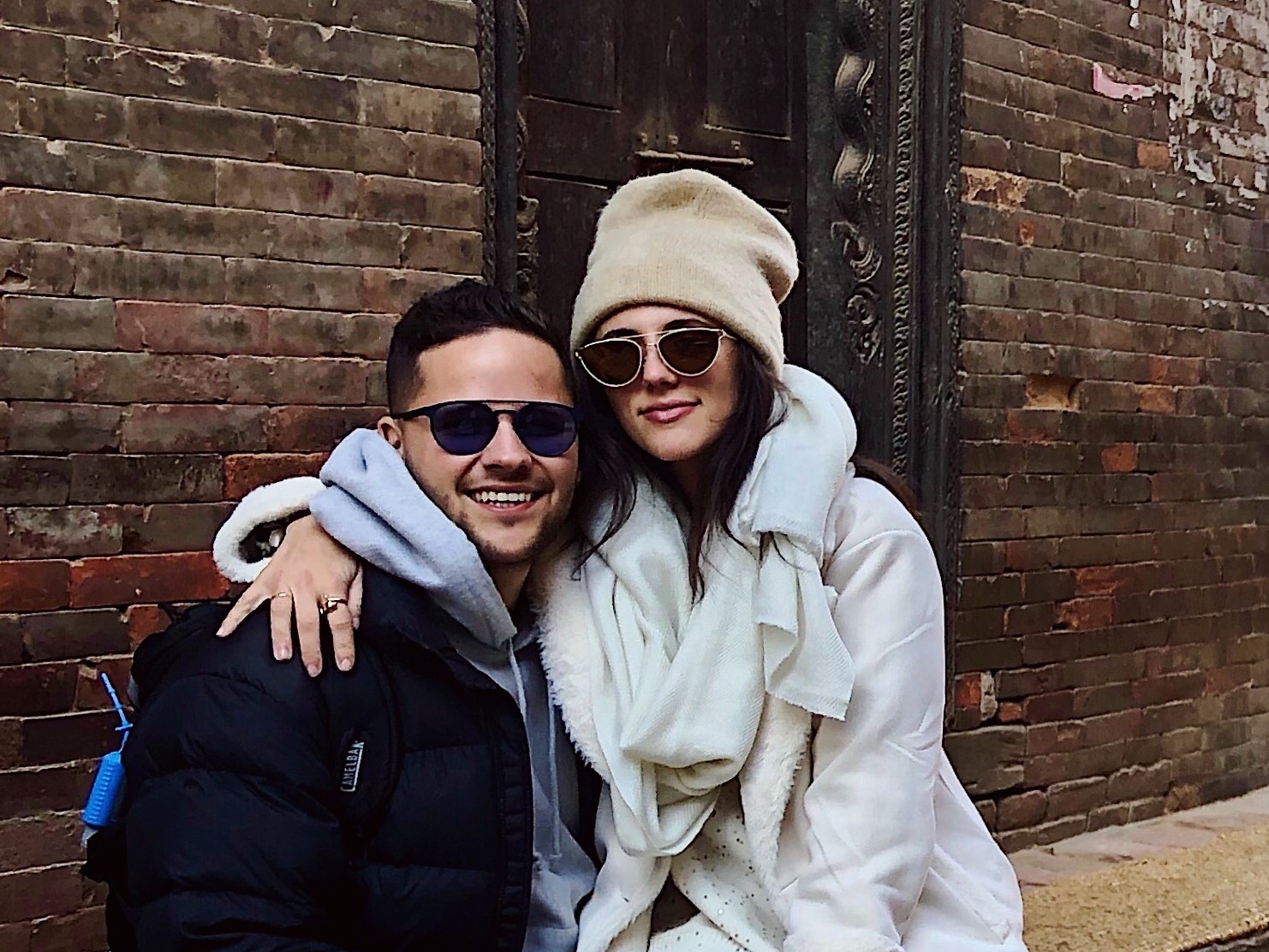
Mayama is Nepali for “In Love.” CASHE’s founders, couple Giulia Giancola and Vlad Litinetsky, have built their luxury cashmere brand on love, empathy, and appreciation. CASHE introduced their partnership with NYF here, and their brand’s commitment to Fair Trade, gender equality, ethical working environments, empowered entrepreneurship for traditional Nepalese craftspeople, and cultural respect make them a joy to work with.
CASHE donates 10% of all their proceeds to NYF, and they’re generously using their brand’s media attention to boost NYF’s visibility. CASHE thoughtfully spotlighted NYF in this recent appearance in British Vogue, as well as in People’s Valentine’s list.

Mayama: the Collection
Now CASHE is offering a beautiful new Valentine’s Day collection called “Mayama”. These lovingly-designed His&Hers robes capture the timeless spirit of romance. Each purchase supports Nepalese farmers and artisans whose families have worked with cashmere for generations.
Explore Mayama here, and check out CASHE’s other luxurious collections. On the CASHE website, you can also learn about the ways philanthropy inspires and guides their brand.
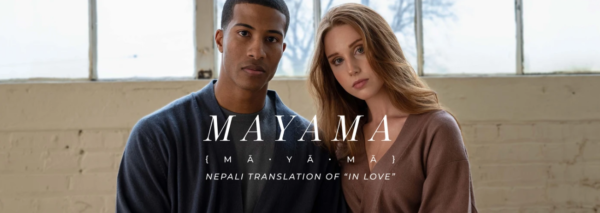
Mayama indeed! We’re definitely feeling the love at NYF. Giulia and Vlad’s love for Nepal’s people and traditions fills us with joy.
Tradition
In a recent Forbes spot, CASHE briefly highlighted the intricate process behind cashmere’s unmatched comfort.
Giulia and Vlad fell in love with Nepal and its craftspeople on an adventure trip in December 2019, when they discovered the deep well of culture behind Kathmandu’s rich cashmere industry. They marveled at the quality of the handcrafted products available, examining scarves, blankets, and more to admire the differing techniques used by each vender.
Their tour guide and friend, Bipin, was delighted to share stories of cashmere’s history as they traveled between attractions.

Many people are surprised to learn that even now, 100% cashmere is crafted by hand. From the beginning, as Himalayan farmers hand-brush their cashmere goats to collect the precious raw fibers in the springtime, the process is so delicate and precise that no machine can do it. (And inventors have tried!)
The fibers are hand-sorted to isolate the special, soft, warm undercoat from the goats’ coarser outer hairs. Each goat only produces a small amount of this wool each year—not even enough for a single scarf. Nepalese families who have worked with cashmere for generations then wash, dye, and dry the wool before spinning it into thread or yarn—again, by hand.
Machines can’t accomplish the spinning because individual raw cashmere fibers are so short. Only well-practiced human fingers can ensure the spinning produces long, smooth, consistent, unbroken threads. This work is painstaking, and there are no shortcuts. The Nepalese artisans behind this work have devoted years of their lives to developing this skill.
Smoother than silk, finer than lambswool, warmer than alpaca; simultaneously durable, biodegradable, renewable, and sustainable—cashmere has been a global fixture of luxury fashion and comfort for centuries.
But so often, the history of cashmere as a textile erases the role of the traditional Himalayan artisans and craftspeople who developed this remarkable product in the first place.
CASHE wants to highlight and elevate these remarkable artists—and to ensure that Nepalese craftspeople are treated fairly in the global market.
“We want our standards as customers to translate into the manufacturing of CASHE,” Giulia says.
“There’s something so special about knowing how and where your clothes are made, and the cross-generational value that cashmere has in Nepal.”
Vlad adds, “There is a great deal of pride in the local craftsmen and women that ensures genuine quality. CASHE is more than ready-to-wear; it’s a tool for us to educate our consumers on the craft and its connection to Nepal.”
#LoveWorks
Vlad and Giulia’s love for Nepal extends far beyond cashmere.
“After spending time in Nepal and getting to know the beautiful culture, its people and their stories, we were motivated to give back and honor the values that brought our ideas to life. Now more than ever, it’s crucial that philanthropy is part of our brand DNA,” Vlad says.
That’s why 10% of all CASHE proceeds are donated to NYF—helping ensure Freedom, Shelter, Health, and Education for Nepalese children and young adults.

As CASHE and NYF take on 2021 together, we can expect extraordinary momentum around philanthropy, sustainability, and most importantly, education. Giulia is looking to disrupt philanthropic entrepreneurship and female leadership, bringing new meaning to worldly fashion. The Mayama Valentine’s Day collection is only a small a piece of that process—but one CASHE is proud to share, spreading love and kindness across the globe.
CASHE is making sure their #LoveWorks by keeping philanthropy and ethical entrepreneurship front and center as their brand grows. And NYF is so proud of the partnership we’re building!
As CASHE prepares to launch a new collection in March (promising striking new styles inspired by the natural wonders of Nepal!), we at NYF want to encourage attention to CASHE and brands like them. There are so many ways to ensure your #LoveWorks!
Happy Valentine’s Day!
Luxury Cashmere Brand CASHE Announces Partnership with NYF!
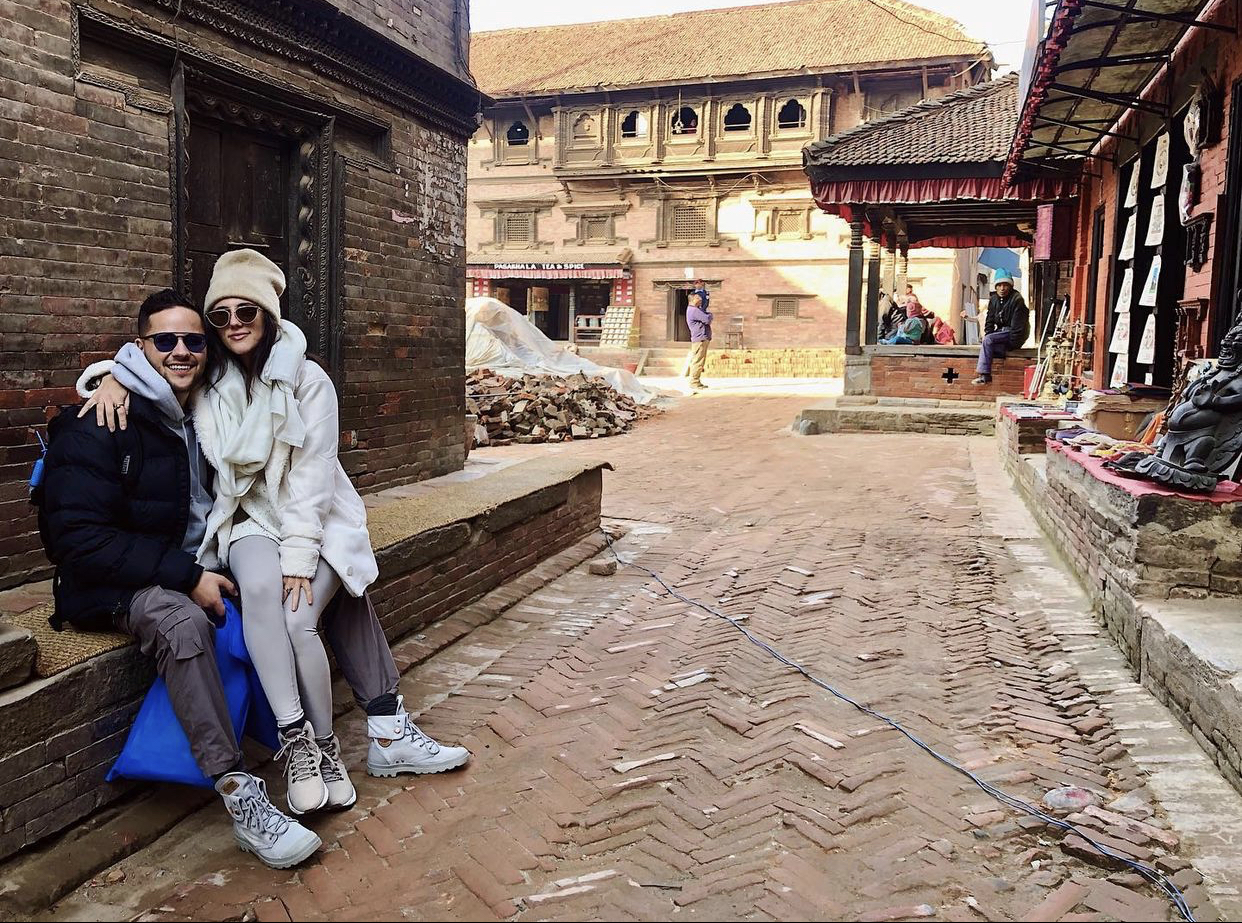
Luxury cashmere is a point of national pride in Nepal. Each artisan’s traditional craftsmanship is unique—the result of generations of dedication. This strikingly beautiful textile—thinner, warmer, and softer than traditional sheep’s wool—has captivated the world for centuries.

Namasté, NYF friends! We’re Giulia Giancola and Vlad Litinetsky, co-founders of CASHE. Designed in Los Angeles and handcrafted in Nepal, CASHE is an ode to the spiritual and skilled craftsmen and women we met on a trip to Nepal’s Durbar Square in December 2019. The moment we began sifting through handmade cashmere sweaters, blankets, and scarves, we decided to bring the high-end knitwear home to launch a mindful brand of our own. Our mission is to connect citizens of the world to fine Nepali cashmere.
We’re so proud to be announcing our partnership with NYF! Philanthropy is tightly woven into CASHE’s direct-to-consumer business model, introducing a unique and natural connection between Nepal and consumers worldwide. 10% of all our proceeds are donated to NYF.
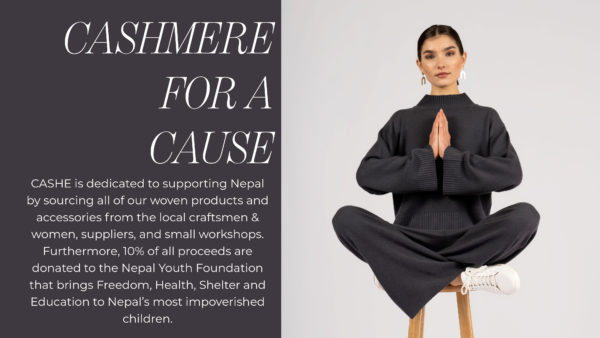
When we launched CASHE in early 2020, we chose to build on the foundations of sustainability, philanthropy, and craftsmanship. We aspire to create an impactful connection between ourselves, our customers, and Nepal by sourcing and partnering with local craftspeople across Kathmandu who devote their lives to the art of bringing forth the world’s finest cashmere. You can read more about our story and our ideals here.
Luxury cashmere is much more than a product—it’s a cultural tradition guided by generations of human ingenuity. We’re still collaborating with our tour guide and friend, Bipin, who noticed our fascination with authentically-crafted cashmere and guided us deeper into this timeless world.
As we explored Nepal, from the Kathmandu shops where cashmere crafts are sold, to the Dhulikhel highlands where cashmere goats live out their lives, our adventure trip evolved into a brand.
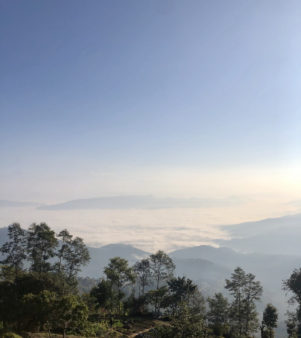
The views in Dhulikhel are unlike any in the world. Cashmere goats and their human caretakers have enjoyed these views for generations, warmed in the cold winter by the unique wool prized across the world.
Each story Bipin told, and each vender we met, deepened our connection to the people driving the cashmere industry in Nepal. CASHE takes pride in ethical sourcing and offering cruelty-free collections of undeniably premier, sustainable and delicate luxury cashmere styles. We are committed to Fair Trade: fair wages and equal pay for equal work to women and men, safe and empowering work conditions, environmental stewardship, and respecting cultural identity.
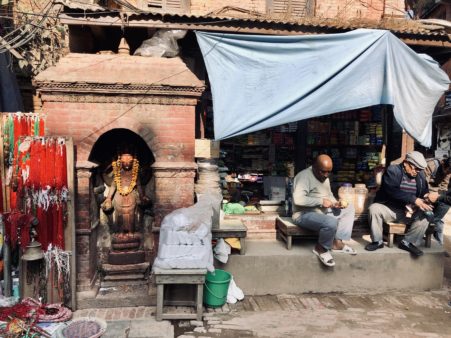
In 2019 Kathmandu, the past and present intermingle. Hidden within each shop are treasures generations in the making.)
CASHE is grateful for the opportunity to support the communities who fight so hard for their traditions and trades.
And we want to do more.
CASHE and NYF are currently collaborating on a variety of creative and educational projects in support of Nepalese women and children. In partnership with NYF, CASHE is producing a short, powerful docu-film capturing the life stories of two Nepali women and their experiences balancing motherhood and work. These stories—of one woman proudly supporting NYF’s foundational efforts and another working in manufacturing producing CASHE cashmere—weave together to illuminate the beauty of Nepal’s culture, traditions, and the undeniable strength of Nepalese women.
This project is slated to roll out on International Women’s Day 2021. CASHE is in talks with a variety of digital distribution partners for media exposure.
CASHE has been featured in a variety of publications in the last few months, including a coveted highlight in the latest British Vogue!
Luxury cashmere from CASHE was also included in holiday gift features in People, PopSugar, W Magazine, Town & Country, Byrdie, and Brit + Co. Giulia’s work at CASHE was featured on Guest of a Guest.
Wherever possible, we highlight our partnership with NYF.
Luxury cashmere is only the beginning—and CASHE has been an incredible, gratifying journey so far. Check back soon for more information on our Valentine’s Day celebrations!
Thank you for being on this journey with us!
-Giulia & Vlad
Vaccines for COVID-19 Arrive in Nepal!
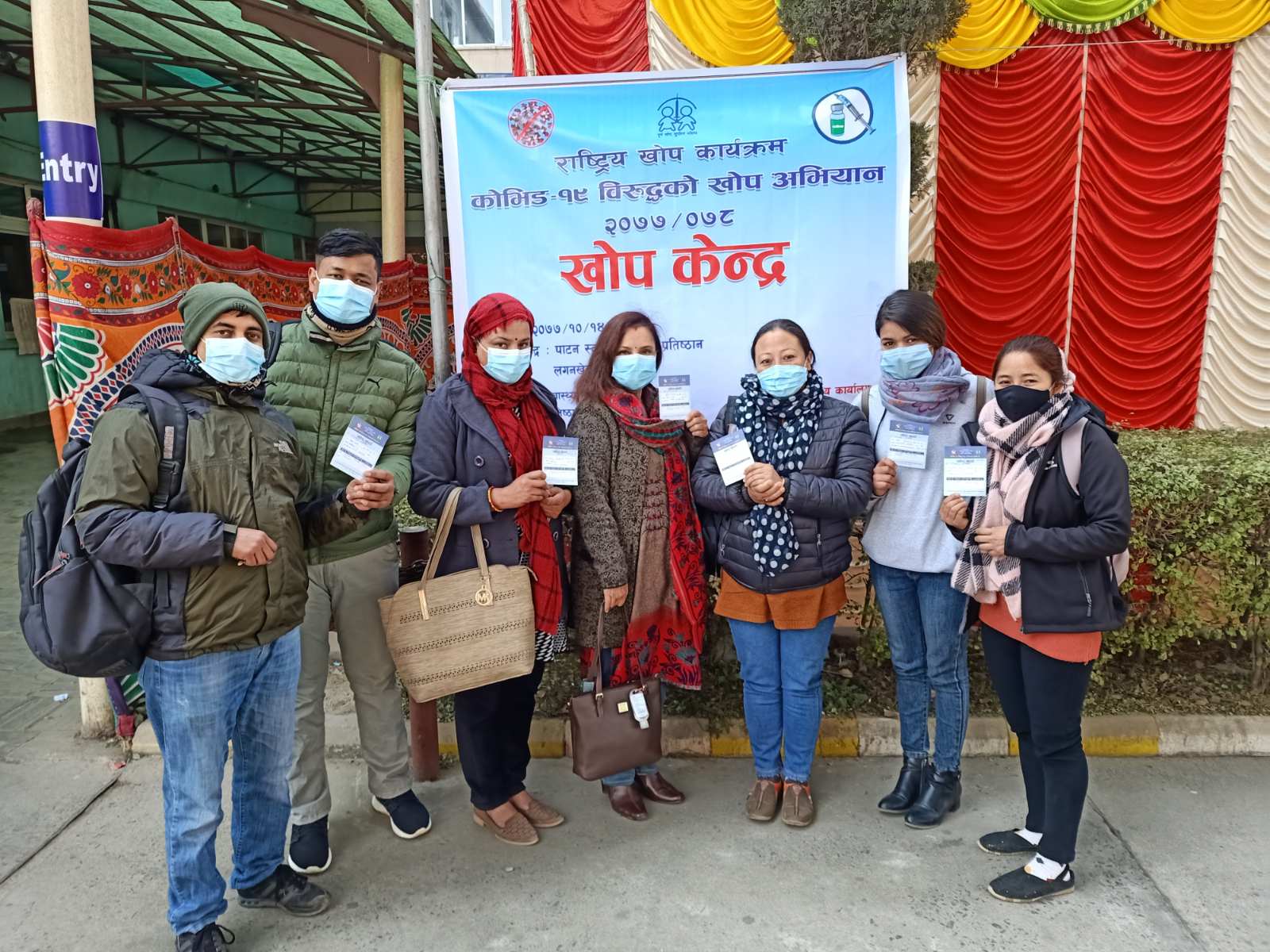
Nepal has successfully secured COVID vaccines through donations from neighboring countries! We’re excited to share that they have started administering the vaccines to high-risk groups and essential service providers.
All NYF staff members at the Nutritional Rehabilitation Home and the New Life center have received the vaccine, and the staff at Olgapuri Children’s Village are in the process of receiving it.
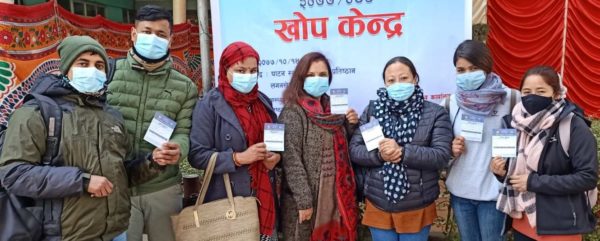
In early February 2021, our Nutritional Rehabilitation Home staff members display their newCOVID vaccine cards.
We will continue the Lito for Life program until this nutritional support is no longer needed in hard-hit communities. But except for Olgapuri Vocational School (which will require extra safety measures), all of our programs have cautiously resumed operations!
Thank you to the NYF community for making all of this possible, and for supporting our work during these difficult times. Dhanyabad!


